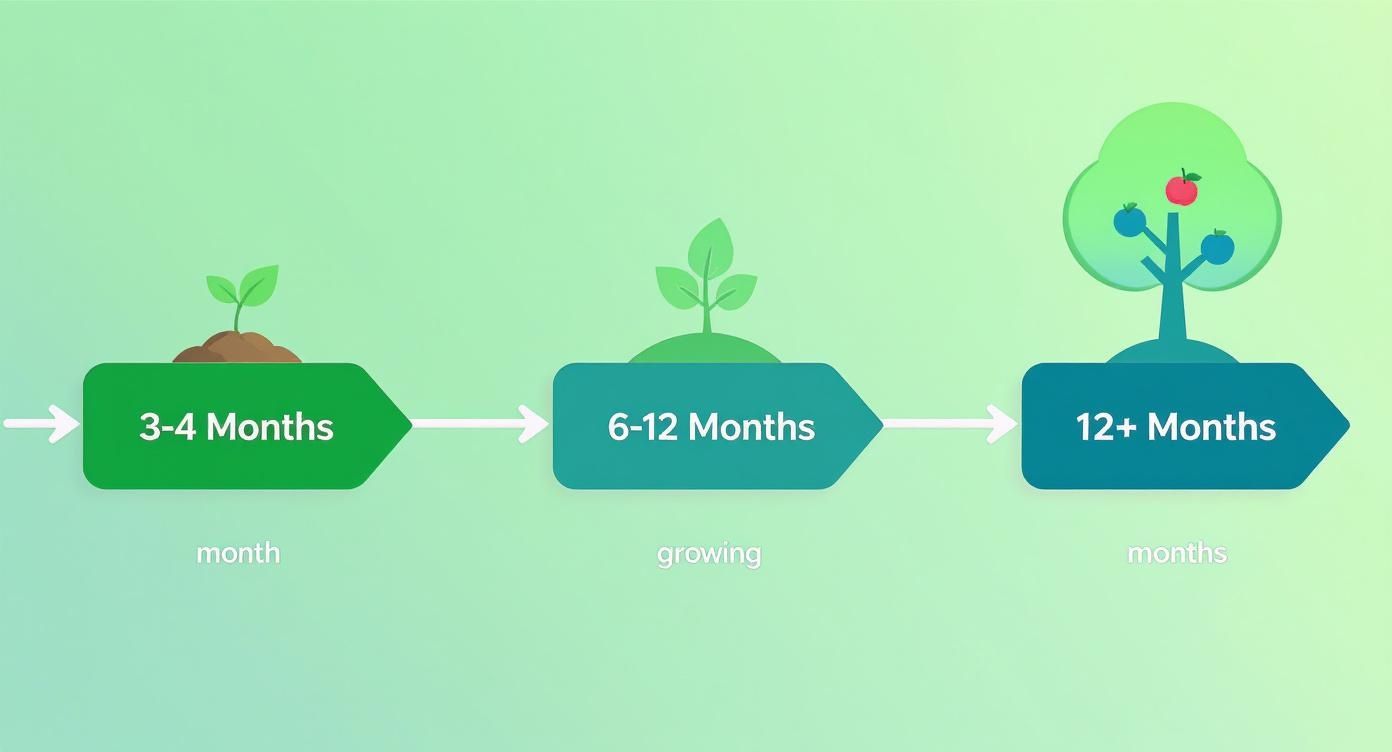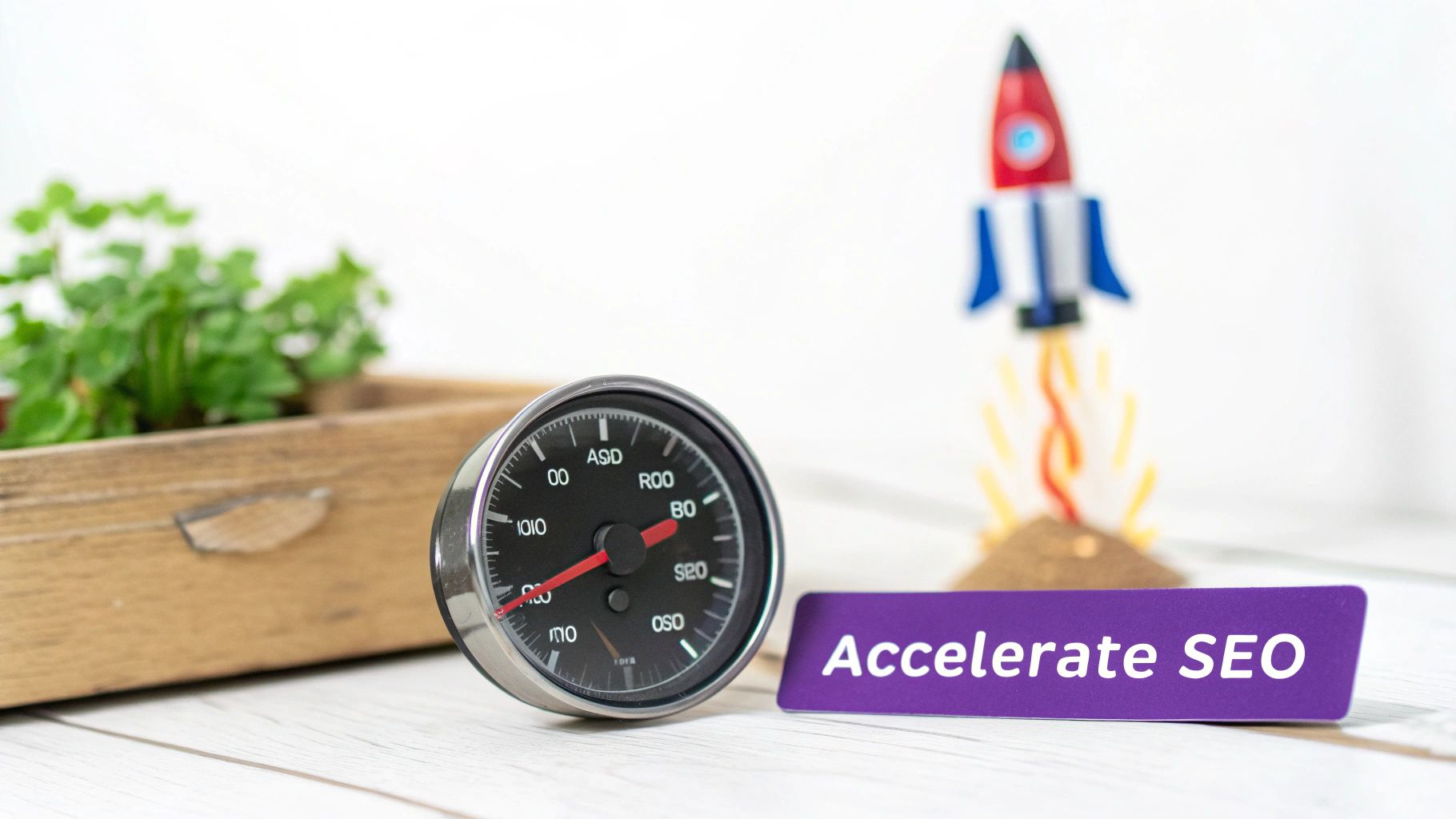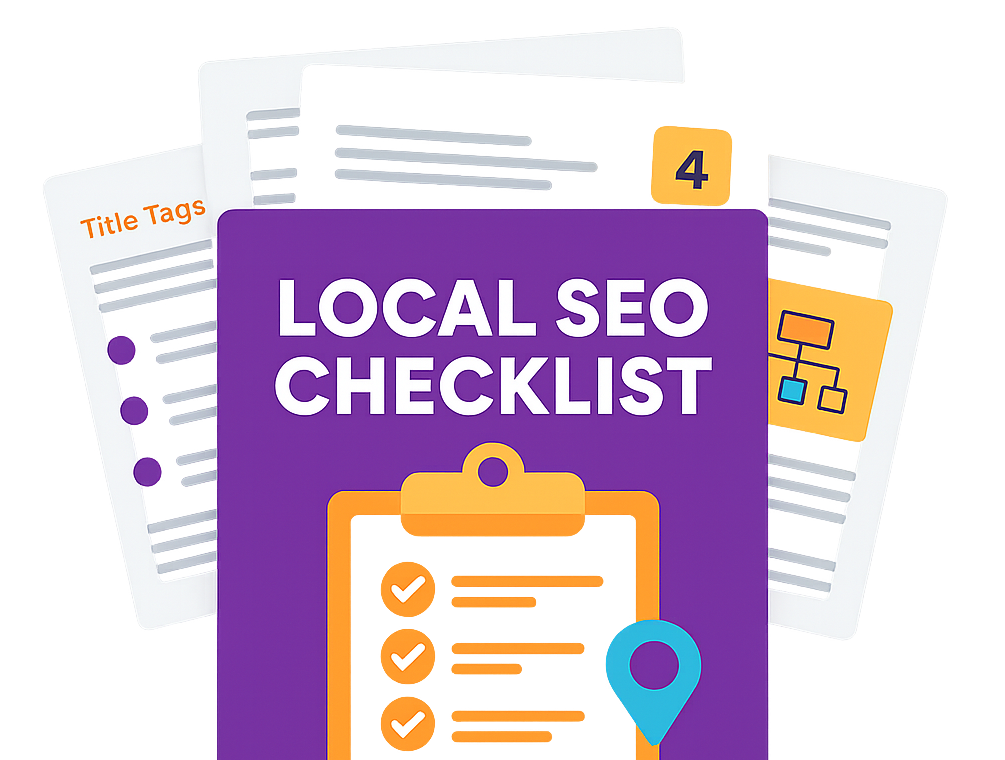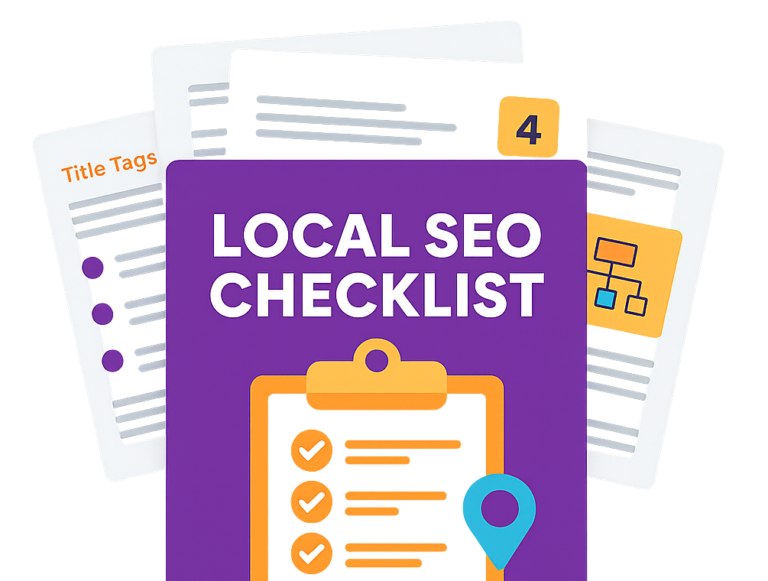So, how long does SEO really take to show results? It’s the million-pound question, isn't it?
While you might spot some early glimmers of progress in 3-4 months, most UK businesses should realistically expect to see significant, needle-moving results within 6 to 12 months. This is the point where your investment truly starts to pay off with a noticeable increase in organic traffic, leads, and sales.
Your Realistic UK SEO Timeline
Think of search engine optimisation less like flipping a light switch and more like planting a tree. The first few months are all about preparing the soil and nurturing the roots—the foundational work you do before you see any real growth above ground.
We’ll break down this timeline, explore what "results" actually look like at each stage, and uncover the critical factors that decide whether your journey is on the fast track or the scenic route.
This visual timeline gives you a great overview of the typical growth stages of an SEO campaign, from the initial groundwork to achieving those significant results.

As the infographic shows, the early efforts are what lay the foundation for compounded growth later on. It’s a perfect illustration of why SEO is a long-term investment, not a quick fix.
Setting Sensible Expectations
One of the biggest hurdles in SEO is impatience. At its core, SEO is a process of building authority and trust with search engines like Google, and that simply doesn't happen overnight. Any agency promising page-one rankings in a month is selling snake oil, not a sustainable strategy.
SEO is a marathon, not a sprint. The initial investment of time and resources is what builds the momentum for long-term, sustainable organic growth that can become your most profitable marketing channel.
Recent industry data from right here in the UK backs up this patient approach. The average time for SEO efforts to show measurable results is roughly four to six months. In fact, one study of over 150 UK-based businesses found that 68% of companies reported noticeable improvements in organic traffic and keyword rankings within this exact timeframe.
To help you get a sense of what to expect and when, we've put together a table outlining the typical journey.
Typical SEO Results Timeline in the UK
This table summarises the key milestones you can generally expect at different stages of a well-executed SEO campaign in the UK.
| Timeframe | Expected SEO Activity | Typical Results |
|---|---|---|
| Months 1-3 | Technical audit, keyword research, on-page optimisation, competitor analysis. | Improved technical site health, initial keyword ranking movements (often outside the top 50), increased impressions. |
| Months 4-6 | Content creation, initial backlink building, local SEO optimisation. | Keywords start entering the top 20-30 positions, a noticeable uptick in organic traffic, initial lead generation. |
| Months 7-9 | Strategic content amplification, advanced link building, user experience (UX) improvements. | Key commercial keywords break into the top 10, consistent growth in traffic and leads, improved conversion rates. |
| Months 10-12 | Refining strategy based on data, targeting more competitive keywords, building brand authority. | Solid top-page rankings for target keywords, predictable organic lead flow, establishing authority in your niche. |
| Year 2+ | Expanding keyword targets, dominating the search landscape, continuous improvement. | Market leadership, significant ROI, organic traffic becomes a primary and reliable source of business growth. |
Remember, this is a general guide. Your specific results will hinge on factors like your industry's competitiveness and the state of your website when you begin.
Tracking Progress Along the Way
During those early months, it's easy to get discouraged if you're only looking at sales figures. Instead, progress is measured through leading indicators. Keeping a close eye on these metrics is crucial for confirming your strategy is on the right track long before the revenue starts rolling in. To stay organised, you might find it helpful to use a clear and effective monthly SEO report template.
Here are the key early performance indicators to watch:
- Improved Keyword Rankings: Seeing your targeted keywords climb from page ten to page three might not feel like a huge win, but it's a massive step in the right direction.
- Increased Organic Impressions: This means more people are seeing your website in search results, even if they aren't clicking just yet. It's the first sign of growing visibility.
- Better Technical Health: Resolving crawl errors, fixing broken links, and improving site speed are foundational victories that pave the way for future ranking success.
The Six Factors That Define Your SEO Speed

Ever wondered why one business starts seeing results in six months, while another is still spinning its wheels after a year? It’s not down to luck. The answer lies in a specific set of variables that either hit the accelerator or slam the brakes on your progress.
Getting to grips with these six factors is the first step to setting realistic expectations for how long SEO will take to work for you.
Think of it like training for a marathon. Your finish time will depend on your current fitness, the quality of your training plan, the toughness of the course, and what resources you have for coaching and gear. SEO is exactly the same.
1. Website History And Authority
An older, well-established website is like a seasoned runner with a history of strong finishes. It’s already built a degree of trust with Google. Search engines have been crawling it for years, it has a natural backlink profile, and it’s a known quantity.
A brand-new domain, on the other hand, is a complete unknown. It has zero history, no authority, and no trust signals. Google is naturally more cautious with new sites, often putting them in a "sandbox" period to see how they perform before granting them any real visibility. A seasoned domain almost always outpaces a new one in the early days.
2. Technical Foundations
Your website’s technical health is its engine. If it’s poorly built, sluggish to load, or a maze for search engines to navigate, you’re trying to run that marathon with the handbrake on. You could have the most amazing content in the world, but if Google's crawlers can't find or make sense of it, you’re going nowhere fast.
Common technical roadblocks include:
- Slow Page Speed: Studies have shown that a delay of just a few seconds can send bounce rates through the roof, telling Google that users are having a bad time.
- Mobile Responsiveness: With over 60% of searches now happening on mobile, a site that’s a pain to use on a phone is at a massive disadvantage.
- Crawlability Issues: Things like broken links, convoluted URL structures, or a misconfigured
robots.txtfile can stop search engines from indexing your most important pages.
Sorting out these foundational issues is almost always the first, most crucial step in any SEO campaign. Without a solid technical base, everything else you do will be compromised.
3. The Competitive Landscape
The intensity of your competition has a huge impact on your timeline. It's the difference between opening a small artisan bakery in a quiet village versus launching a new car insurance comparison site for the entire UK. One is a local fun run; the other is the Olympics.
Highly competitive sectors like finance, law, or travel are jam-packed with big brands that have been pouring millions into SEO for over a decade. They have enormous authority and massive backlink profiles. Trying to break into those search results demands a significant, long-term investment. On the flip side, a local service in a less crowded niche can often see results much, much faster. To get a better idea of what Google looks for locally, check out these key local SEO ranking factors.
Your SEO timeline isn't just about what you do; it's about how your efforts stack up against everyone else fighting for the same digital shelf space.
4. Your Content Strategy
Content is the fuel for your SEO engine. But here's the thing: just churning out generic blog posts doesn’t cut it anymore. Google's algorithms are incredibly smart at figuring out if your content is genuinely high-quality, helpful, and written by an expert.
A winning content strategy is all about creating truly useful resources that answer your audience's questions better than anyone else. This could be in-depth guides, original research, helpful online tools, or unique industry insights. This kind of top-tier content not only ranks better but also naturally attracts backlinks—which leads us neatly to our next point.
5. Backlink Quality And Quantity
Backlinks—links pointing from other websites to yours—are one of the most powerful ranking signals out there. Think of them as votes of confidence. They tell Google that your site is a credible, authoritative source of information that other people trust.
But not all links are created equal. A single link from a highly respected source like the BBC or a major UK university is worth far more than hundreds of low-quality links from spammy directories. Building a strong profile of backlinks from respected, relevant UK sources is a methodical process. It takes time, but it’s absolutely essential for building long-term authority.
6. Your SEO Investment
Finally, your budget and resources play a direct role. While you can't just buy your way to the top of Google, money does buy the expertise, tools, and time needed to execute a solid strategy effectively.
A larger investment allows for:
- Expertise: Hiring a skilled SEO agency or in-house specialist.
- Tools: Accessing premium software for research, auditing, and tracking progress.
- Content Creation: Commissioning high-quality articles, graphics, and videos.
- Link Building: Fuelling digital PR and outreach campaigns to earn those valuable links.
A limited budget just means progress will be slower. Tasks might have to be done in-house, which comes with a steeper learning curve. The level of investment you make directly impacts the momentum and speed of your entire campaign.
Understanding Your Website's Starting Position
Every SEO journey is different because every website starts from a unique place. The real answer to "how long does SEO take?" is tied to whether your website is a finely-tuned machine ready to go, or if it's dragging along the weight of old problems. Your digital history has a huge say in your future success.

Think of it like this: a brand-new website is like an unknown startup. It has zero reputation and needs to build trust with Google from the ground up, which takes patience. On the other hand, an established domain might already have a solid foundation of authority and a history of being relevant, giving it a serious head start.
The Role of a Technical SEO Audit
Before you can even think about planning your route, you need to know exactly where you are on the map. This is where an SEO audit comes in. It's the essential first step—a complete health check for your site that diagnoses its current condition and uncovers any hidden issues.
An audit isn't just a box-ticking exercise; it's the bedrock of a successful strategy. It digs into the critical technical bits that can either speed up your progress or bring it to a grinding halt. Without this initial deep dive, you're flying blind, likely wasting time and money on tactics that are doomed to fail because of a flaw you can't even see.
An SEO audit is like a mechanic's diagnostic report for your car. It tells you what’s working perfectly, what needs a tune-up, and what’s about to break down, ensuring you fix the real problems before you even think about hitting the accelerator.
A proper assessment will inspect dozens of areas to build a clear picture of your starting line. You can get a sense of just how deep it goes by checking out a comprehensive technical SEO audit checklist to see all the factors involved.
Key Areas of Assessment
During an audit, an SEO specialist will analyse several core components of your site to get a real gauge of its health. These are the main things that determine your starting position:
- Domain History and Authority: Has the domain ever been penalised by Google? An older, trusted domain with a clean track record will almost always see results faster than a new one or one that has a spammy past.
- Existing Backlink Profile: The audit will scrutinise the quality and relevance of the websites currently linking to you. A profile packed with high-quality, relevant links is a massive asset. One littered with toxic links is a liability that needs sorting out, pronto.
- Technical Health: This covers everything from site speed and mobile-friendliness to whether search engines can actually crawl and index your pages properly. Technical problems are like driving with the handbrake on.
Understanding these elements is crucial for setting realistic expectations. If your site has a strong foundation, you can build on it quickly. But if it's weighed down by technical debt and bad backlinks, the first few months will be all about cleanup before you can even start building momentum.
Sizing Up Your Industry and Competition
Search engine optimisation doesn’t happen in a vacuum. It's a competitive arena, and the time it takes to see results is directly tied to the strength of those already at the top.
Imagine trying to open a new coffee shop on a high street already packed with big-name cafés versus opening in a quiet neighbourhood with no competition. The same principle applies online. Your digital high street could be a bustling metropolis or a small village, and figuring out which one you’re in is step one for setting a realistic SEO timeline.
Analysing Your Digital High Street
First things first, you need to identify your real online competitors. These aren't necessarily your direct business rivals down the road; they're the websites that currently own the top spots in search results for the keywords you want to target.
If you're a plumber in Cambridge, your competition is whoever shows up on page one for "emergency plumber Cambridge," even if they're based in the next town over.
Once you know who you’re up against, it’s time to put on your detective hat and scrutinise their strategy. A thorough investigation is key to understanding the mountain you need to climb. To get started, you can find a structured approach in our guide on how to conduct a competitor analysis.
Gauging Competitor Strength
Not all competitors are created equal. Some industries, like finance or law, are dominated by huge, authoritative brands that have been pouring money into SEO for over a decade. Trying to outrank them is a serious, long-term commitment.
Here’s what to look for when evaluating how tough the competition really is:
- Content Quality and Depth: Are they publishing genuinely helpful, expert-led articles and guides? Or are their blogs just filled with thin, generic posts? High-quality content is a dead giveaway of a serious SEO investment.
- Backlink Authority: Use an SEO tool to check out their backlink profile. Are they earning links from reputable sources like the BBC, major industry publications, or universities? A strong backlink profile is like having a roster of powerful endorsements, and it takes a huge amount of time to build.
- Website Experience: Is their site fast, modern, and easy to navigate on a phone? A polished, professional website signals to Google that they care about user experience, which is a massive ranking factor.
Understanding the competitive landscape is all about managing expectations. If your rivals have been building their digital authority for years, you simply won't overtake them in a few months. This is a long-term campaign, not a quick skirmish.
On the other hand, if you're in a niche market where the top-ranking sites look outdated or have very little quality content, you've struck gold. In these less crowded spaces, a focused SEO strategy can deliver results much faster—sometimes in as little as six months—because the bar for success is significantly lower.
Proven Strategies to Accelerate Your SEO Results
While SEO is definitely a long game, that doesn't mean you have to sit on your hands and wait passively for things to happen. If you focus your efforts on the right high-impact activities, you can build momentum much faster and shrink the time it takes to see a real return. It's all about working smarter, not just harder.

These are the strategies we use to get our clients ahead of the curve, without ever touching the risky shortcuts that could land you in hot water with Google.
Prioritise Foundational Technical Fixes
Before you can even think about winning the race, you have to make sure your car is in perfect working order. A technical SEO audit should always be your first port of call, as it flags the critical issues that are essentially putting a handbrake on your progress.
Fixing problems like slow page speed, broken links, or indexing errors removes major roadblocks. Once these are sorted, search engines can crawl and understand your site far more efficiently—the absolute baseline for getting any page ranked.
Target Long-Tail Keywords for Early Wins
It’s tempting to go straight for the big, competitive one or two-word phrases, but that’s a recipe for a long, frustrating wait. A much smarter move is to focus on long-tail keywords. These are longer, more specific search queries (usually three words or more) that have lower search volume but much, much higher intent.
For example, a new bakery in Bath has almost zero chance of ranking for "cakes" in its first year. But it stands a far better chance of ranking for "vegan birthday cakes delivered in Bath" within just a few months.
Securing rankings for these specific, high-intent phrases allows you to capture qualified traffic early on. These initial victories build topical authority, creating a foundation that helps you rank for more competitive terms later.
Create Exceptional, Link-Worthy Content
Generic, run-of-the-mill blog posts just won’t cut it if you want to accelerate your results. To really speed things up, you need to create content that is so genuinely useful, insightful, or unique that other websites want to link to it. We often call this a "linkable asset."
Think about what you can produce that your competitors haven't:
- Original Research: Run a survey in your industry and publish the findings.
- Ultimate Guides: Create the single most comprehensive resource on a specific topic.
- Free Tools: Develop a simple calculator or template that solves a common problem for your audience.
This kind of outstanding content attracts backlinks naturally, which is one of the most powerful signals you can send to Google to boost your authority and speed up rankings.
Launch a Proactive Backlink Campaign
Of course, you can't just publish great content and wait for the links to appear. A proactive digital PR or outreach campaign is crucial for putting foot to the floor on your off-page SEO. This involves identifying relevant, high-authority websites in your niche and giving them a compelling reason to link back to your exceptional content.
Building high-quality backlinks is a methodical process, but it’s a direct message to Google that your site is a trusted, authoritative resource. If you're looking for a deeper dive, our detailed guide explains how to build backlinks with effective, sustainable strategies.
Optimise Your Google Business Profile
For any business that serves a local area, optimising your Google Business Profile (GBP) is one of the fastest ways to gain visibility. It's a free tool that gets you into the local map packs and search results, often delivering results much quicker than traditional organic rankings.
Make sure your profile is fully completed with accurate information, high-quality photos, and a steady stream of customer reviews. An active and well-managed GBP can start driving local traffic and phone calls in a matter of weeks, not months.
Why New Content Takes Time to Gain Traction
It’s one of the most common frustrations in business: you pour hours into crafting the perfect blog post, hit publish, and… crickets. A week goes by, and your article is still nowhere to be seen on Google. This isn't a sign you’ve failed; it’s just how search engine optimisation works. Before any new content can earn its spot in the search results, it has to go on a very specific journey.
First, Google’s crawlers need to discover your new page, which usually happens when they follow a link to it from another page. Once found, they’ll crawl it to figure out what it’s all about. Only then can it be added to Google's enormous digital library, known as the index.
But just being in the library doesn't mean your page will be recommended to anyone. That’s where a little patience comes in.
The Sandbox and Building Trust
Many SEO experts talk about a concept often called the "Google Sandbox." It’s not an official term from Google, but it neatly describes a common observation: new websites and fresh pages often seem to go through an initial waiting period. During this time, Google is essentially assessing your content’s credibility and watching for user engagement signals before it trusts it with a decent ranking.
This theory helps explain why you almost never see instant results. A well-optimised page doesn't just appear on page one overnight; it gradually builds authority and climbs the rankings over months. Think of it as a feature, not a bug, designed to ensure users get high-quality, trustworthy results. The initial climb is almost always the steepest.
A recent report focused on UK websites revealed a sobering reality: 96.55% of new pages receive zero traffic from Google within their first three months. You can discover more surprising UK SEO statistics and see the data for yourself.
This really reinforces the idea that SEO requires a total shift in mindset. You're not looking for a quick win. Instead, the goal is to build long-term value. Every piece of content you create is like planting a seed. With time and consistent effort, it will grow into a valuable asset that drives traffic for years to come.
Got Questions About SEO Timelines? We’ve Got Answers
Even with the clearest roadmap, it’s completely normal to wonder how long this whole SEO thing is really going to take. Let's tackle the most common questions we hear from business owners, so you can set sensible expectations for your investment.
Can I Get SEO Results in One Month?
In a word? No. While you might spot a few keywords twitching up the rankings, seeing a meaningful jump in traffic in just 30 days is next to impossible. The first month is all about laying the groundwork.
Think of it like building a house – you can't put the walls up before the foundations are properly set. This initial phase is where we do the heavy lifting:
- Running a fine-toothed comb through your site with a technical audit.
- Digging deep into keyword research and sizing up the competition.
- Mapping out a content strategy and fixing any glaring technical issues.
It's crucial, unglamorous work that makes everything else possible.
Why Is My Competitor Ranking Faster Than Me?
It’s a frustrating feeling, for sure, but there are almost always solid reasons for it. It's rarely a mystery. Several factors could be giving your competitor an edge that lets them see results more quickly.
It could be that they have:
- An older, more established website that Google already trusts.
- A much stronger backlink profile built up over years.
- A bigger budget to pour into creating content and earning links.
- Simply been investing in SEO consistently for much longer.
The key is to analyse their strategy to understand their advantages. That’s how you find the gaps and create a plan to overtake them in the long run.
SEO is a competitive sport. Your timeline isn't just about what you do; it's about how your efforts measure up against businesses that might have had a massive head start.
Does Paying for Google Ads Speed Up My Organic SEO?
This is a common misconception, but the answer is no. Google Ads (PPC) and organic SEO are two completely different beasts. Paying for ads will not directly boost your organic rankings or speed up your SEO progress.
That said, PPC can be a fantastic wingman for your SEO efforts. It gives you instant data on which keywords convert, builds brand awareness, and drives traffic to your site right now, while you patiently wait for your long-term organic presence to kick in.
When Should I Expect a Return on My SEO Investment?
You’ll typically start to see a positive return on your investment (ROI) from SEO somewhere in the 6 to 12-month window. For the first few months, your spending will almost certainly be higher than the financial return.
But as your rankings improve and organic traffic starts flowing, the value of that "free" traffic really begins to add up. From that point on, the benefits don't just continue—they compound, turning SEO into one of the most sustainable and profitable marketing channels you have.
Ready to start your SEO journey with a clear, transparent plan? At Bare Digital, we provide a free SEO Health Check to identify your biggest opportunities. Get your custom SEO proposal today and see how our specialists can drive measurable growth for your business.








